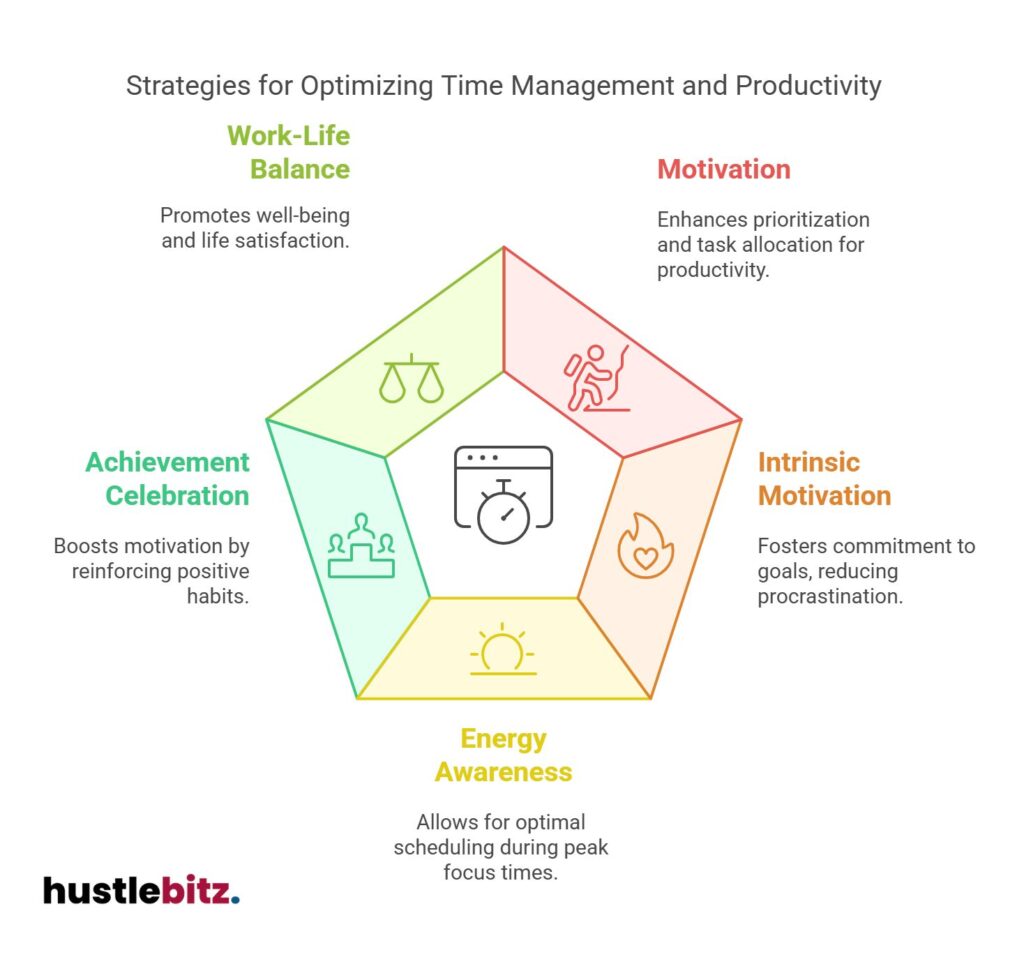Motivation plays an essential role in mastering time management by enhancing the ability to prioritize tasks and allocate time effectively. A strong drive to achieve goals fosters commitment to efficient practices, ultimately boosting productivity and work quality. Motivated individuals are better equipped to focus on high-priority tasks, utilize tools such as priority matrices, and set deadlines that create urgency. Intrinsic motivation further deepens this commitment, reducing procrastination and improving time allocation. By harnessing motivation effectively, one can create a balanced schedule that optimizes energy levels, leading to sustained productivity. Explore the strategies that can elevate your time management skills further.
Key Takeaways
- Motivation enhances prioritization and task allocation, leading to effective time management and increased productivity.
- Intrinsic motivation fosters commitment to personal goals, reducing procrastination and improving time allocation.
- Recognizing peak energy periods allows for optimal task scheduling, enhancing focus and efficiency.
- Celebrating small achievements boosts motivation, reinforcing positive time management habits.
- A balanced approach to work and personal life promotes overall well-being and life satisfaction.

The Connection Between Motivation and Effective Time Management

Effective time management is intrinsically linked to motivation, as a strong drive to achieve goals enhances one’s ability to prioritize tasks and allocate time efficiently. Motivation plays a crucial role in developing effective time management skills, as it fuels the commitment needed to manage time effectively. When individuals are motivated, they are more inclined to adopt productive time management practices that help them navigate their daily responsibilities.
The importance of time management cannot be overstated; it directly impacts productivity, work quality, and overall satisfaction. When motivated, individuals can better prioritize tasks, focusing on what truly matters and aligning their actions with their goals. This prioritization becomes especially vital when overcoming time management challenges, as it allows for strategic decision-making regarding task execution.
To enhance your time management skills, it is essential to cultivate a motivating environment. Setting clear, achievable goals and breaking them down into manageable tasks can significantly boost productivity. Additionally, maintaining a positive mindset can propel individuals to adhere to their schedules and remain committed to their objectives.
Harnessing Motivation to Prioritize Tasks and Boost Productivity

Building on the connection between motivation and effective time management, harnessing this motivation is key to prioritizing tasks and enhancing productivity. Motivation plays a crucial role in determining how individuals choose to allocate their time and energy. When individuals are motivated, they are more likely to adopt effective time management habits that allow them to prioritize tasks based on urgency and importance.
To effectively manage their time, individuals can utilize various time management strategies that align with their motivation levels. By focusing on high-priority tasks, they can boost productivity and maximize their output. The following table outlines different strategies for harnessing motivation to prioritize tasks effectively:
| Time Management Strategies | Impact on Productivity |
| Establish Clear Goals | Provides direction and focus |
| Use a Priority Matrix | Helps distinguish urgency vs. importance |
| Set Deadlines | Creates a sense of urgency |
| Break Tasks into Smaller Steps | Makes tasks more manageable |
The Role of Intrinsic Motivation in Mastering Time Management
Intrinsic motivation significantly influences an individual’s ability to master time management by fostering a deeper commitment to personal goals and tasks. When individuals are intrinsically motivated, they engage with their objectives not just out of obligation but from a genuine desire to achieve and grow. This commitment enables them to prioritize effectively, ensuring that their efforts are aligned with their values and aspirations.
Effective time management hinges on the ability to manage your time in a way that promotes personal well-being. Intrinsically motivated individuals are more likely to allocate their personal time wisely, focusing on tasks that resonate with their interests and passions. This alignment between motivation and action reduces the likelihood of procrastination, allowing for more consistent progress toward goals.
Moreover, intrinsic motivation enhances time management skills by encouraging individuals to reflect on their priorities. By recognizing what truly matters to them, they can develop strategies to improve their time management and mitigate distractions.
This introspective approach not only fosters a sense of agency but also reinforces a positive feedback loop; as they see the benefits of their efforts, their motivation to continue improving grows.
Overcoming Procrastination: How Motivation Fuels Time Efficiency
Understanding the connection between motivation and procrastination is vital for enhancing time efficiency, as motivated individuals are more likely to take decisive action toward their goals rather than delay tasks. Procrastination often stems from a lack of motivation, leading to inefficiencies that hinder effective time management. To overcome procrastination, it is essential to harness motivation as a driving force for productivity.
Mastering time management involves utilizing various time management tools that can help structure tasks effectively. For instance, employing time tracking methods allows individuals to identify patterns in their work habits and pinpoint areas where they may be wasting time. By analyzing this data, one can make informed decisions that lead to an increase in productivity.
Establishing strong time management skills also requires the ability to prioritize self-care. By ensuring that personal well-being is addressed, individuals are better equipped to tackle their responsibilities with renewed energy and focus. This holistic approach to overcoming procrastination facilitates the efficient use of time, allowing for the completion of tasks without unnecessary delays.
Ultimately, motivation serves as a key element in the pursuit of effective time management. It empowers individuals to confront procrastination head-on and cultivate habits that promote a more organized and productive lifestyle. By integrating these strategies into daily routines, one can develop a proactive mindset that encourages continuous progress toward their goals.
Creating a Motivational Mindset for Better Time Management

A motivational mindset is essential for enhancing time management skills, as it equips individuals with the drive to prioritize tasks and maintain focus on their objectives.
Motivation serves as the foundation for better time management, enabling individuals to allocate time effectively and manage time efficiently. When one is motivated, the tendency to procrastinate diminishes, facilitating a proactive approach to task completion.
To cultivate a motivational mindset, it is important to set clear goals that align with personal values. These goals create a roadmap for action, allowing individuals to focus their time on what truly matters.
In addition, establishing clear boundaries between work and personal life is crucial. This separation not only fosters a healthier work-life balance but also enhances motivation, as individuals can dedicate themselves fully to each aspect of their lives.
Efficient time management hinges on the ability to assess one’s time management abilities accurately. Regular self-reflection can help identify patterns of procrastination or inefficiency, guiding adjustments to improve productivity.
Furthermore, celebrating small achievements along the way reinforces motivation and makes the process of mastering time management more rewarding.
Ultimately, creating a motivational mindset is pivotal for mastering time management. By nurturing motivation and implementing strategic practices, individuals can effectively manage their time, achieve their goals, and enhance their overall productivity.
The integration of motivation into time management strategies can lead to significant improvements in both personal and professional endeavors.
Balancing Energy and Motivation to Optimize Your Schedule

To optimize your schedule effectively, it is essential to balance both energy levels and motivation, as these elements significantly influence productivity and task management.
Energy and motivation are interconnected and play a crucial role in successful time management. Recognizing your peak energy periods can help you allocate dedicated time for specific tasks, ensuring that you are working at your most efficient.
Effective time management is crucial for maintaining a healthy work-life balance. By strategically blocking time for various activities, you can manage time efficiently while ensuring that both professional and personal commitments are met. This dual focus not only enhances productivity but also fosters a sense of accomplishment and well-being.
To balance work and personal life, it is imperative to assess your daily routines and identify when your energy levels are highest. During these periods, prioritize tasks that require the most focus and motivation. Conversely, use lower energy times for less demanding activities, allowing you to remain productive without overwhelming yourself.
Ultimately, motivation acts as the driving force behind your efforts, while energy provides the necessary fuel to sustain them. By consciously aligning your tasks with your energy and motivational levels, you can create a more optimized schedule that promotes effective time management.
This approach not only leads to improved productivity but also supports a sustainable lifestyle, allowing you to thrive both at work and in your personal life.
Final Thoughts
Mastering time management is not just about organizing tasks—it’s about understanding the critical role motivation plays in driving productivity and maintaining focus. By aligning your energy levels with your motivation, setting clear goals, and overcoming procrastination, you can create a balanced schedule that enhances both personal and professional life. The strategies discussed in this article emphasize the importance of cultivating a motivational mindset, which is essential for effective time management. By integrating these principles into your daily routine, you can achieve greater productivity, reduce stress, and foster a more fulfilling and balanced life.




